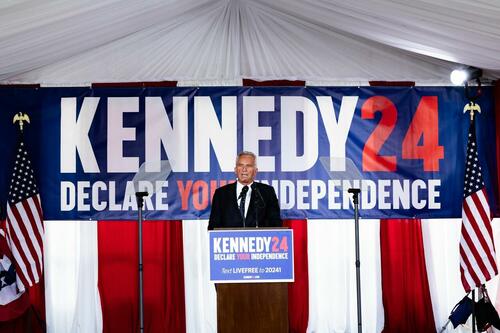
Earlier this month, Robert F. Kennedy, Jr announced he was abandoning a Democratic Party that's overtly hostile to his 2024 presidential campaign, choosing to run as an independent candidate instead.
He's already drawing a hefty 16% in three-way contest with Biden and Trump, according to a recent NPR/PBS/Marist poll. However, all the public support in the world will mean nothing unless RFK Jr can overcome a major hurdle for any independent candidate: getting his name on the ballot in 50 states and the District of Columbia.
There's more to that feat than gathering signatures. "It takes significant expertise to navigate specific rules for every state and the requirements needed before signatures can even begin to be collected — and then to beat back the legal challenges that will almost certainly follow," writes Politico's Brittany Gibson.

Time is a big factor, and one that makes the ballot challenge all the more daunting for Kennedy's campaign, given his relatively late start. Consider that the nascent No Labels party has been at it for two years says it will complete the process for 28 states by New Year's, with a goal of hitting 50 for the election.
Utah's deadline comes first, and in less than three months -- on January 6. “I wondered if they had thought it all through before making the switch over,” ballot access expert Michael Arno tells Politico.
Signature requirements vary wildly: Kennedy has to get 200,000 signatures in California but a mere 275 in Tennessee. To be on the safe side, campaigns need to exceed those targets so they still qualify after signatures are scrutinized. Many states add an extra level of complexity by requiring that the group of people signing a ballot petition represent various parts of the state to a stipulated extent.
There's also a need to hire signature collectors, with the cost typically coming in between $7 and $10 per autograph. Those collectors need thick skin, as they're prone to being confronted by party loyalists angered over an independent's potential "spoiler" role.
To defend their duopoly, Democratic and Republican parties each routinely file legal challenges against independent candidates, and Kennedy's campaign is surely bracing for legal battles over the coming months.
However, it's not yet obvious which party has the most to lose from Kennedy's presence on the ballot. In the latest NPR/PBS/Marist polls, Kennedy lifted Biden's lead over Trump from 3 points to 7.
So @RobertKennedyJr has fired his antiwar campaign manager @Dennis_Kucinich and replaced him with his CIA officer relative... Run, don't walk away from RFK! https://t.co/chMStpd5eU pic.twitter.com/m75ZOawfFn
— Daniel McAdams (@DanielLMcAdams) October 14, 2023
Kennedy's impact on Trump and Biden will likely change over time, as he stakes out different policy positions. Even before the Hamas attack on Israel stirred that issue, Kennedy alienated progressives and non-interventionist libertarians with full-throated support of Israel that went well beyond the level of lip-service often deemed mandatory of politicians. Meanwhile, his flirtation with reparations for black people -- which his campaign calls "direct redress payments" -- is certain to rankle disaffected Republicans.
Earlier this month, Robert F. Kennedy, Jr announced he was abandoning a Democratic Party that’s overtly hostile to his 2024 presidential campaign, choosing to run as an independent candidate instead.
He’s already drawing a hefty 16% in three-way contest with Biden and Trump, according to a recent NPR/PBS/Marist poll. However, all the public support in the world will mean nothing unless RFK Jr can overcome a major hurdle for any independent candidate: getting his name on the ballot in 50 states and the District of Columbia.
There’s more to that feat than gathering signatures. “It takes significant expertise to navigate specific rules for every state and the requirements needed before signatures can even begin to be collected — and then to beat back the legal challenges that will almost certainly follow,” writes Politico‘s Brittany Gibson.

Time is a big factor, and one that makes the ballot challenge all the more daunting for Kennedy’s campaign, given his relatively late start. Consider that the nascent No Labels party has been at it for two years says it will complete the process for 28 states by New Year’s, with a goal of hitting 50 for the election.
Utah’s deadline comes first, and in less than three months — on January 6. “I wondered if they had thought it all through before making the switch over,” ballot access expert Michael Arno tells Politico.
Signature requirements vary wildly: Kennedy has to get 200,000 signatures in California but a mere 275 in Tennessee. To be on the safe side, campaigns need to exceed those targets so they still qualify after signatures are scrutinized. Many states add an extra level of complexity by requiring that the group of people signing a ballot petition represent various parts of the state to a stipulated extent.
There’s also a need to hire signature collectors, with the cost typically coming in between $7 and $10 per autograph. Those collectors need thick skin, as they’re prone to being confronted by party loyalists angered over an independent’s potential “spoiler” role.
To defend their duopoly, Democratic and Republican parties each routinely file legal challenges against independent candidates, and Kennedy’s campaign is surely bracing for legal battles over the coming months.
However, it’s not yet obvious which party has the most to lose from Kennedy’s presence on the ballot. In the latest NPR/PBS/Marist polls, Kennedy lifted Biden’s lead over Trump from 3 points to 7.
So @RobertKennedyJr has fired his antiwar campaign manager @Dennis_Kucinich and replaced him with his CIA officer relative… Run, don’t walk away from RFK! https://t.co/chMStpd5eU pic.twitter.com/m75ZOawfFn
— Daniel McAdams (@DanielLMcAdams) October 14, 2023
Kennedy’s impact on Trump and Biden will likely change over time, as he stakes out different policy positions. Even before the Hamas attack on Israel stirred that issue, Kennedy alienated progressives and non-interventionist libertarians with full-throated support of Israel that went well beyond the level of lip-service often deemed mandatory of politicians. Meanwhile, his flirtation with reparations for black people — which his campaign calls “direct redress payments” — is certain to rankle disaffected Republicans.
Loading…





